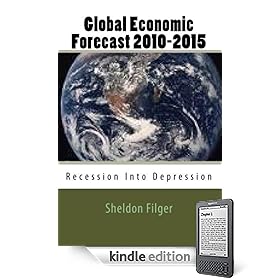The speculation after the November presidential election was that Barack Obama originally wanted Bill Clinton’s former Treasury Secretary, Larry Summers, to serve in the same capacity in his administration. When criticism arose within his own party due to Summers’ strong ties to Wall Street, Obama selected Timothy Geithner as Treasury Secretary and appointed Larry Summers to serve as Director of the National Economic Council. In essence, Summers is serving as the principal economic advisor to President Barack Obama. In that role, Summers was undoubtedly one of the principal architects of the Obama administration’s so-called Economic Recovery Act, the $787 billion deficit-driven stimulus package that was supposed to put the brakes on the free fall in employment numbers in the United States.
Increasingly, many critics, not all of them Republican, have raised serious doubts as to the efficacy of the Obama stimulus plan. However, the Obama team is not about passivity and turning the other cheek in the face of public doubts. They are pushing back, and taking the lead in connection with the stimulus plan has been Larry Summers.
Appearing before the Peterson Institute for International Economics, Larry Summers wanted to make the case that the Recovery Act was, in fact, working. One would expect a man with as brilliant an intellect as Mr. Summers is alleged to possess to offer convincing analysis based on solid macroeconomic data. However, if that was your expectation, you are out of luck. This is what President Obama’s lead economic advisor had to offer as irrefutable “proof” that the administration’s Recovery Act was functioning according to plan: the number of people conducting Google searches for the term “economic depression,” which had increased last fall in the wake of the demise of Lehman Brothers, was now “back to normal.”
Is Larry Summers serious? This is the strategic data point that the key actor within Obama’s team of economic advisors is fixated on? Google searches are now the leading indicator and most persuasive metric of what’s happening to the real economy? Well, Mr. Summers, last fall, when you noticed a spike in Google searches related to an economic depression, I established a new website on the crisis, GlobalEconomicCrisis. Com. During the first few weeks that the website existed, there was hardly any traffic. Now, months afterwards, the site receives hundreds of thousands of hits per month. Is that indicative of economic trends? Of course not. But neither is Larry Summers’ “observation.”
A far more relevant indicator of what is occurring with the real economy is the unemployment rate. Contrary to the declarations of the Obama administration that passage of the Recovery Act would stem the tide of job layoffs and stabilize the official unemployment rate at 8%, this sobering statistic has now increased to 9.5%, excluding the long-term unemployed and underemployed unable to find full-time jobs. All indications are that this number will exceed double-digits by the end of the year.
The attempt by Larry Summers to utilize nonsensical data in defence of the core economic policy of the Obama administration in addressing the most severe economic contraction in American history since the Great Depression not only fails to reassure an increasingly uncertain public; it increases scepticism regarding the suitability of Larry Summers to serve as the White House point-person on the economy. Those who had pre-existing doubts regarding Summers due to his role in dismantling the Glass- Steagall Act ( which eliminated the longstanding separation between investment and retail banks, leading to the subprime implosion that sparked the current economic crisis) will see them reinforced by the bizarre rationalizations he is now increasingly resorting to in defence of the Obama administration’s economic policies.
Perhaps we should not be surprised by the convoluted logic Summers invokes in support of his view of reality. After all, a major factor in his fall from the presidency of Harvard University was his “explanation” for why females were grossly under-represented in tenured academic positions in the sciences and engineering: “the different availability of aptitude at the high end,” according to Summers.
Starting with Alan Greenspan as long-serving Fed chairman, and continuing with the likes of Rubin, Paulson, Bernanke, Geithner and now Summers, the public has been subjected to propaganda from the political establishment that presents those who have been selected to design our economic architecture as being brilliant beyond all measure. If we have learned anything over the past year, it is that these supposed geniuses of macroeconomic policy are in fact highly fallible. If nothing else, Larry Summers’ perplexing descent into meaningless trivialities suggests that this key economic policymaker is as detached from reality as most of his recent predecessors. Rather than being reassured by his reference to Google searches that bright rays of sunshine are about to dissipate the dark economic clouds hovering over the nation, I see Larry Summers’ ascendancy in the economic policymaking hierarchy of the Obama administration as the harbinger of a long recessionary winter which still lies ahead.





